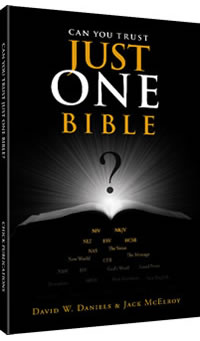The Difference Between Translator and Teacher
Picture this: You have the chance to earn a large sum of money by carefully following a set of instructions. All you must do is follow them carefully! There is just one problem: they are written in a language you cannot read. You need a translator.
You will have to choose between two translators. One is an old conservative who wants to translate the words as directly as possible from the first language to yours. It will be up to you to read the result carefully and follow it.
The other translator will go one step further: He will render a translation which describes his best understanding of how the author wanted you to carry out the instructions. Written as a paraphrase, it will be easy reading, and easy to follow. There is just one catch: you will have to trust that his understanding of how it should be done agrees with what the author intended, or you will fail and end up with nothing!
Which translator will you choose? Do you want to know exactly what the instructions say, or will you trust the second translator's ability to understand the author's intent and not lead you astray?
Selecting a Bible version involves the same kind of choice. There are two basic approaches: formal equivalence and dynamic equivalence. Bibles translated by formal equivalence will take careful reading. At times, you will have to study history to learn the cultural background before you can fully understand the text.
The translator is simply rendering the text in your language... nothing more. But you will have the confidence of knowing that you are not trusting another man's understanding, or theology, but can make up your own mind what God wants. In the English language, the King James Bible is the only Bible available that has been translated using this approach.
On the other hand, Bibles translated by dynamic equivalence will read as easily as a novel. When a story seems difficult to understand without a little history, the author may even change it to a form he believes you will better understand! You will never know for sure what God said, but must trust the translator's theology to lead you into truth. The translator here is acting as a teacher, not just telling you what God said, but adding his understanding of what God meant!
Many Christians have developed the vital habit of reading the Bible text as they listen to a teacher explain it. They always judge the teaching by the written word. After all, the teacher is just a man, and can make mistakes. It's vital to know exactly what God said! But what can you do if the Bible in your hand doesn't give you God's Word, but a teacher's explanation of God's intent? Now what can you use to judge the teaching? You have no authority you can trust.
This is just one of the reasons the King James Bible is the superior English translation in the world today... formal equivalence. The translators were determined not to tell you God's intent, but just convey to you His words!
It is the translator's job to tell you what God said. It is the teacher's job to tell you how to understand and apply it to your life. Always insist on a Bible that gives you God's words, so you have an absolute upon which to judge everything else.
- See more articles on related topics:
- Bible Versions
- King James Bible
- Bible Translation
Other Articles from November/December 1996:
More on Bible Versions:
Products of Interest:
-

Can You Trust Just One Bible?
160 pages
Answers to the most common anti-KJV accusations. -

Look What's Missing!
256 pages
For years, publishers have been removing words, and even whole verses, from modern Bibles. What's missing from your Bible? Take a look! -

Answers to Your Bible Version Questions
224 pages
David W. Daniels answers difficult questions about the KJV. Learn how to defend the KJV and why you can trust it. -

Why They Changed the Bible
228 pages
See who is behind the gradual changing of modern Bibles. There’s no guessing about what these people believe. They will tell you, in their own words! -

If The Foundations Be Destroyed
98 pages
What does the NIV have against Jesus? Is your Bible missing important verses and doctrines? If it is an New International Version there's a lot missing!



